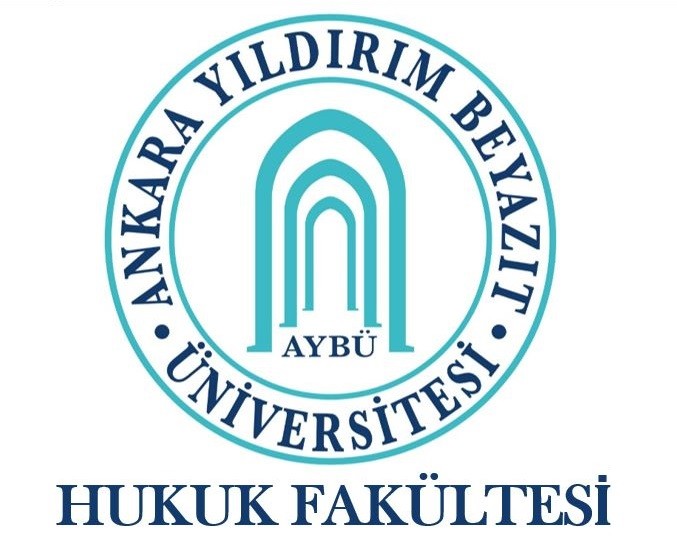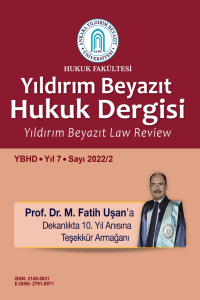Abstract
Wage is defined as the amount of money paid by an employer or by a third party to a person in exchange for specific work-related tasks performed by him/her. While wage is one of the elements of the employment contract, it is the employer’s fundamental obligation. Wages are not only the reward for the work performed by the worker, but also sometimes the only source of livelihood of him/her. The underpayment or non-payment of the wages, even though it is deserved, may put both the worker and his/her family in a difficult situation. Therefore, there are important regulations in Turkish legislation that protect and secure the wages of the worker against the arbitrary transactions of the employer, third parties and also their own transactions. In this context, this study will address the issue of the protection of worker’s wages within the framework of doctrinal views and judicial decisions.
References
- Akın, Levent (1995) Maaş ve Ücret Haczi, AÜHF, S.1-4, s.335-363.
- Akyiğit, Ercan (2021) Bireysel İş Hukuku Ders Kitabı, Güncellenmiş 2.Baskı, Seçkin Yayınları, Ankara.
- Alp, Mustafa (2005) İş Sözleşmesinin Değiştirilmesi, Ankara.
- Başbuğ, Aydın (1999) Türk İş Hukukunda Disiplin Cezaları, Ankara.
- Can, Mertol (2004) “Yeni Medeni Kanun’un İnşaatçı (Yapı) İpoteği Hakkındaki Hükümleri İle İpoteğin Kendi Adına Tescilini talep Edebilecek Kişiler Bakımından Bir Değişiklik Yapılıp Yapılmadığı Meselesi”, GÜHFD, Haziran-Aralık 2004, C.VIII, S.1-2
- Centel, Tankut (1998) İş Hukukunda Ücret, İstanbul.
- Çelik, Nuri; Caniklioğlı, Nurşen; Canbolat Talat/Özkaraca Ercüment (2021) İş Hukuku, Yenilenmiş 34. Bası, Beta Yayınları, İstanbul.
- Çil, Şahin (2021) İş Hukuku Yargıtay İlke Kararları (2019-2021 Yılları), 8. Baskı, Yetkin Yayınları, Ankara.
- Çil, Şahin (2010) İş Hukukunda İşçinin Ücreti, Turhan Kitabevi, Ankara.(Ücret)
- Çopuroğlu, Çağlar (2013) Ücret ve Korunması, Turhan Kitabevi, Ankara.
- Dönmez, Kazım Yücel (2018) İşçi Ücreti ve Ödenmemesinden Kaynaklanan Hukuki Sorunlar, Seçkin, Ankara.
- Ekmekçi, Ömer/ Yiğit Esra (2021) Bireysel İş Hukuku Dersleri, 3. Baskı, On İki Levha Yayınları, İstanbul.
- Ekonomi, Münir (1976) İş Hukuku C.I, İstanbul.
- Evren, Ö. Kemal (2007) İş Hukukunda Ücret ve Uygulaması, Ankara.
- Eyrenci, Öner/ Taşkent Savaş/ Ulucan Devrim/ Baskan Esra (2020) İş Hukuku, 10. Baskı, Beta Yayınları, İstanbul.
- Göktaş, Seracettin (2020) Türk İş Hukukunda Haksız Fesih, 1. Bası, Seçkin Yayınları, Ankara.
- Göktaş Seracettin/Çil Şahin (2003) Açıklamalı-İçtihatlı Basın İş Kanunu (4857 Sayılı İş Kanunu Ve İlgili Mevzuat), Turhan Kitabevi Yayınları, Ankara.
- Kar, Bektaş (2021) Deniz İş Hukuku (Denizcilik Çalışma Sözleşmesi Ve Emsal Yargıtay Kararları İle), 3. Bası, Yetkin Yayınları, Ankara.
- Karaçöp, Eda (2012) Türk İş Hukukunda Ücretin Korunması, İzmir, (Yayımlanmamış Yüksek Lisans Tezi).
- Mollamahmutoğlu Hamdi/ Astarlı Muhittin/ Baysal Ulaş (2021) İş Hukuku Ders Kitabı (Cilt 1: Bireysel İş Hukuku), Güncellenmiş 5. Baskı, LYKEION Yayıncılık, Ankara.
- Mollamahmutoğlu Hamdi/ Astarlı Muhittin/ Baysal Ulaş (2014) İş Hukuku, 6. Bası, Turhan Kitabevi, Ankara.
- Narmanlıoğlu, Ünal (2014) İş Hukuku Ferdi İş İlişkileri I, Genişletilmiş ve gözden geçirilmiş 5. Baskı, Beta, İstanbul.
- Senyen Kaplan, E. Tuncay (2020) Bireysel İş Hukuku, Yenilenmiş 11. Baskı, Gazi Kitabevi, Ankara.
- Süzek, Sarper (2021) İş Hukuku, Yenilenmiş 21. Baskı, Beta, İstanbul.
- Urhanoğlu, İştar/Köken, Hilal (2021) Şemalarla Bireysel İş Hukuku, Adalet, Ankara.
Abstract
Ücret bir kimseye bir iş karşılığında işveren veya üçüncü kişiler tarafından sağlanan ve para ile ödenen tutar olarak tanımlanmaktadır. Ücret iş sözleşmesinin unsurlarından biri olmakla birlikte işverenin en temel borcudur. Ücret hem iş görme ediminin karşılığı hem de kimi zaman işçinin tek geçim kaynağıdır. Ücretin eksik ödenmesi ya da hak edildiği halde hiç ödenmemesi işçiyi ve ailesini güç durumda bırakabilir. Bu nedenle mevzuatımızda işçinin ücretini işverenin, üçüncü kişilerin işlemlerine ve kendi işlemlerine karşı koruyan, güvence altına alan önemli düzenlemeler bulunmaktadır. Bu bağlamda çalışmamızda işçi ücretinin güvencesi öğreti görüşleri ve yargı kararları çerçevesinde ele alınmaya çalışılmıştır.
References
- Akın, Levent (1995) Maaş ve Ücret Haczi, AÜHF, S.1-4, s.335-363.
- Akyiğit, Ercan (2021) Bireysel İş Hukuku Ders Kitabı, Güncellenmiş 2.Baskı, Seçkin Yayınları, Ankara.
- Alp, Mustafa (2005) İş Sözleşmesinin Değiştirilmesi, Ankara.
- Başbuğ, Aydın (1999) Türk İş Hukukunda Disiplin Cezaları, Ankara.
- Can, Mertol (2004) “Yeni Medeni Kanun’un İnşaatçı (Yapı) İpoteği Hakkındaki Hükümleri İle İpoteğin Kendi Adına Tescilini talep Edebilecek Kişiler Bakımından Bir Değişiklik Yapılıp Yapılmadığı Meselesi”, GÜHFD, Haziran-Aralık 2004, C.VIII, S.1-2
- Centel, Tankut (1998) İş Hukukunda Ücret, İstanbul.
- Çelik, Nuri; Caniklioğlı, Nurşen; Canbolat Talat/Özkaraca Ercüment (2021) İş Hukuku, Yenilenmiş 34. Bası, Beta Yayınları, İstanbul.
- Çil, Şahin (2021) İş Hukuku Yargıtay İlke Kararları (2019-2021 Yılları), 8. Baskı, Yetkin Yayınları, Ankara.
- Çil, Şahin (2010) İş Hukukunda İşçinin Ücreti, Turhan Kitabevi, Ankara.(Ücret)
- Çopuroğlu, Çağlar (2013) Ücret ve Korunması, Turhan Kitabevi, Ankara.
- Dönmez, Kazım Yücel (2018) İşçi Ücreti ve Ödenmemesinden Kaynaklanan Hukuki Sorunlar, Seçkin, Ankara.
- Ekmekçi, Ömer/ Yiğit Esra (2021) Bireysel İş Hukuku Dersleri, 3. Baskı, On İki Levha Yayınları, İstanbul.
- Ekonomi, Münir (1976) İş Hukuku C.I, İstanbul.
- Evren, Ö. Kemal (2007) İş Hukukunda Ücret ve Uygulaması, Ankara.
- Eyrenci, Öner/ Taşkent Savaş/ Ulucan Devrim/ Baskan Esra (2020) İş Hukuku, 10. Baskı, Beta Yayınları, İstanbul.
- Göktaş, Seracettin (2020) Türk İş Hukukunda Haksız Fesih, 1. Bası, Seçkin Yayınları, Ankara.
- Göktaş Seracettin/Çil Şahin (2003) Açıklamalı-İçtihatlı Basın İş Kanunu (4857 Sayılı İş Kanunu Ve İlgili Mevzuat), Turhan Kitabevi Yayınları, Ankara.
- Kar, Bektaş (2021) Deniz İş Hukuku (Denizcilik Çalışma Sözleşmesi Ve Emsal Yargıtay Kararları İle), 3. Bası, Yetkin Yayınları, Ankara.
- Karaçöp, Eda (2012) Türk İş Hukukunda Ücretin Korunması, İzmir, (Yayımlanmamış Yüksek Lisans Tezi).
- Mollamahmutoğlu Hamdi/ Astarlı Muhittin/ Baysal Ulaş (2021) İş Hukuku Ders Kitabı (Cilt 1: Bireysel İş Hukuku), Güncellenmiş 5. Baskı, LYKEION Yayıncılık, Ankara.
- Mollamahmutoğlu Hamdi/ Astarlı Muhittin/ Baysal Ulaş (2014) İş Hukuku, 6. Bası, Turhan Kitabevi, Ankara.
- Narmanlıoğlu, Ünal (2014) İş Hukuku Ferdi İş İlişkileri I, Genişletilmiş ve gözden geçirilmiş 5. Baskı, Beta, İstanbul.
- Senyen Kaplan, E. Tuncay (2020) Bireysel İş Hukuku, Yenilenmiş 11. Baskı, Gazi Kitabevi, Ankara.
- Süzek, Sarper (2021) İş Hukuku, Yenilenmiş 21. Baskı, Beta, İstanbul.
- Urhanoğlu, İştar/Köken, Hilal (2021) Şemalarla Bireysel İş Hukuku, Adalet, Ankara.
Details
| Primary Language | Turkish |
|---|---|
| Subjects | Law in Context |
| Journal Section | PRIVATE LAW |
| Authors | |
| Publication Date | September 12, 2022 |
| Published in Issue | Year 2022 Volume: Prof. Dr. M. Fatih UŞAN'a Dekanlıkta 10. Yıl Anısına Teşekkür Armağanı Issue: 2022-2 |
Cite



